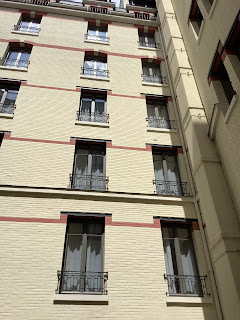In Paris for Bloomsday, Lisa and I visited one of the key locations of Finnegans Wake, the Victoria Palace Hotel, which has been completely renovated since we were last here. It's nice that the hotel's website draws attention to Joyce's stay here.
'Can you hear whispers of verses by James Joyce? The poet’s words echo gently around the Victoria Palace like a soft breeze brushing the hotel’s majestic façade, which dates back to 1913.'
It's curious that they call him a poet rather than a novelist, though he did write one poem here, 'A Prayer', the final poem in Pomes Pennyeach.
The Joyces stayed here five times between August 1923 and June 1925, and Joyce wrote the Mamalujo episode and most of books one and three of Finnegans Wake here.
The hotel is near Montparnasse, and within walking distance of his favourite restaurant of the 1920s, Les Trianons, Edgar Quinet's grave in the cemetery, and Louis Borsch's eye clinic where he had five operations on his left eye.
It was while he was staying here that he learned that Bloomsday was being celebrated:
'There is a group of people who observe what they call Bloom's day – 16 June. They sent me hortensias, white and blue, dyed. I have to convince myself that I wrote that book. I used to be able to talk intelligently about it.'
Joyce to Harriet Shaw Weaver, 27 June 1924
 The Victoria Palace Hotel is Joyce's only Paris address to be mentioned, by its initials, in Finnegans Wake. In the Earwicker sequence, written in the hotel, Joyce describes a rumour that HCE has come to a violent end:
The Victoria Palace Hotel is Joyce's only Paris address to be mentioned, by its initials, in Finnegans Wake. In the Earwicker sequence, written in the hotel, Joyce describes a rumour that HCE has come to a violent end:'Aerials buzzed to coastal listeners of an oertax bror collector's budget, fullybigs, sporran, tie, tuft, tabard and bloody antichill cloak, its tailor's (Baernfather's) tab reading V.P.H., found nigh Scaldbrothar's Hole, and divers shivered to think what kaind of beast, wolves, croppis's or fourpenny friars, had devoured him.' 99.13
The initials also reappear in a footnote and a marginal comment in the lessons chapter:
'V for wadlock, P for shift, H for Lona the Konkubine.' 284.F6
'Vive Paco Hunter'! 286.L1
 |
| The hotel's James bar |
Joyce, who moved into the hotel after his holiday in Bognor Regis, saw the place as a temporary base while flat hunting.
'We left London on Thursday and here we are (homeless, ragged and tanned) running about and looking for a flat.' To T.S.Eliot 15 August 1923
In his letters, he repeatedly complained about the noise of the hotel, which was full of Americans, and the poor light.
There's a letter to Valery Larbaud of February 1924, in which he mockingly gives his address as 'S.James Palace, Dungeon 76, Luteatia.'
Lutetia was the Roman name for Paris. Perhaps he was in room 76?
'The wild hunt still continues in the Paris jungle, stampede of omnibuses and trumpets of taxi elephants etc and in this caravanserai peopled by American loudspeakers I compose ridiculous prose writing on a green suitcase which I bought in Bognor. I want to get as many sketches done or get as many boring parties at work as possible before removal somewhere or anywhere after which I suppose I shall do the same again till I am hauled off to the eye clinic.' To Harriet Shaw Weaver, 17 October 1923
'I am gathering my scattered wits for a different essay and have made plans and jigsaw puzzles in this penumbra of a room'. To HSW 23 October 1923
'O dear me! What sins did I commit in my last incarnation to be in this hole?' To Robert McAlmon, 18 February 1924
'I have been working ten hours a day in semi-dark for the past seven months.' To HSW 6 April 1924
'I am very fatigued, in sight of the operating table and half stupified by the gloom, noise, expense and uncertainty in which I try to work.' To HSW 13 May 1924
'It is impossible to work any longer in this hotel. However, I send you a short poem – the first I have written for six years,' To Valery Larbaud, 22 May 1924
'The weather became very hot a few days ago and at once all the windows in the courtyard were flung open and the inmates leaned on the sills talking, laughing, arguing in all tongues, dominated by two American ladies who discussed loudly selfconsciousness. I endured for four days, then I went out, bought another case, packed and put to storage all my books, gathered my MSS including Shawn...which I could not write out again, made a parcel of them and telephoned to Miss Beach who came and removed them hastily so that there is as much literature now in my room as in your office. I was to have gone on writing a little longer but the nine months' labour was quite enough for me. In this atmosphere I found my memory, vision, power of attention all gradually getting worse yet I knew if the books or even the MSS and notebooks were here I would go on. So I stopped.' To HSW 24 May 1924
I was curious to see if the hotel still has a courtyard. The friendly concierge invited us to look around.
Here it is! Imagine the inmates leaning over these balconies talking loudly about selfconsciousness.
Despite Joyce's grumbling about the hotel, this was the most creative period of his Paris years. Listening to the inmates of the Victoria Palace Hotel 'arguing in all tongues' might have been just what he needed.
James Joyce to Arthur Power, Conversations with James Joyce, p.105
-












